The human face of Syria's refugee crisis
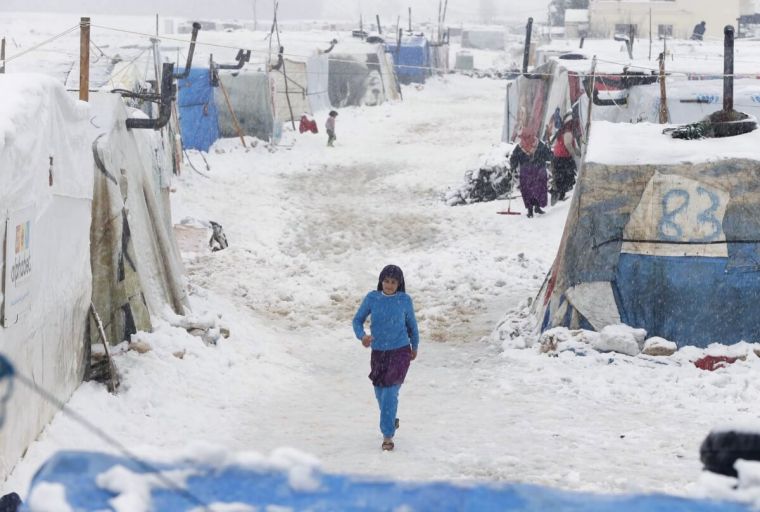
I am writing from a hotel room overlooking the sprawling city of Beirut. As the scorching sun begins to set over the intricate maze of streets that make up this mountainous coastal city, I reflect on the conversations I have had over the last few days.
I have met dozens of Syrian refugees living in appalling conditions in informal settlements in Lebanon's Bekah Valley, just five kilometres from the Syrian border. I have heard dark stories of loss and death, of houses bombed and missing children. I have met people desperate not to get to Europe, but simply to live in peace.
I'd like to introduce you to four of them. These are not soldiers or politicians; they are ordinary human beings caught up in a crisis.
Alia: "We have no choice but to be here."
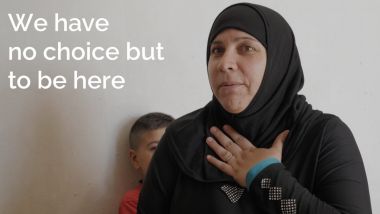
In an unfinished building that looks more like a ruin than an apartment block we make our way up four flights of dangerous concrete stairs. There are gaping holes, no glass in the windows and live exposed electrical wiring hanging loosely from the walls.
We receive a warm welcome from Alia and her five children, who travelled from Syria via a combination of lifts from relatives and bus journeys. They did not want to leave their home, but fearful for their lives when the bombing began, they felt they had no option. That is the most important message that Alia wants the world to know: "We have no choice but to be here."
Alia's son Karim is nine. There's a sparkle in his eye as we talk about football. He wants to play for Real Madrid and score goals like Ronaldo. He's wearing some second-hand tracksuit bottoms sporting the Liverpool logo and the familiar phrase, "You'll never walk alone." But sadly, this family do feel very alone. They are fast running out of savings – it's illegal for Syrians to work in Lebanon, but they need to find money to pay the rent for this apartment.
The circumstances are dire. Alia weeps for her eldest son, who is 15 years old. He earns a few Lebanese pounds by carrying the bags of other children when they walk to school. His mother mourns the fact that he carries other children's school bags but there is no school for him. Instead he goes out to try and scrape a living with his father, risking the wrath of the authorities to bring some money home for his family.
Despite their challenging circumstances, Alia will not let us leave without offering us something to eat. I don't want to offend so I try to pick the smallest sweet to leave the rest for her children.
Miriam: "We still have dreams for our children."
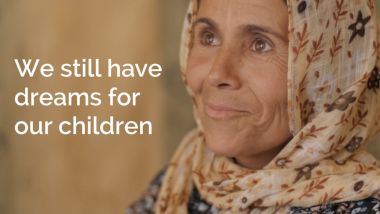
About half of the 1.5 million Syrian refugees in Lebanon are living in informal settlements. Miriam lives in a makeshift tent made out of plastic sheeting stapled onto a flimsy wooden skeleton. The tent has one medium-sized compartment where Miriam and her six children sleep at night. In another compartment there's a gas stove she received yesterday from the landlord. Up until now, she's been cooking with firewood outside the tent.
Miriam is the only adult in the household; her husband has two other wives and he has decided to live with them in another country. Miriam takes care of her children and some of her grandchildren. Even those living in a tent like hers must pay rent – normally around two hundred US dollars a month.
Because she has no money, Miriam works in the vineyard in lieu of rent. Her first shift begins at 5am and she works until 12pm. Then she does another shift from 3pm until 8pm. As I sit on the floor I am reminded of the story of Ruth in the Bible. Ruth was a young widow who chose to become a refugee so that she could care for her family, in her case an elderly mother-in-law. I tell Miriam that her bravery reminds me of Ruth's as she too has put herself at risk to protect her family. I explain that despite the tragedies that happened in her life, God used Ruth to bring great blessing not only to her family but to the whole world as she was a distant ancestor of Jesus.
Miriam asks that I pray for her family, so we sit together and pray that somehow, like Ruth, Miriam's tragedy could turn into blessing for her and her family. I am struck by Miriam's bravery, and her willingness to do what ever it takes to care for her children. She has travelled far from her home along dangerous roads and she has no idea how long she can continue living here in Lebanon.
Miriam feels shame because she cannot afford to send her children to school. They are bubbly kids, full of life and smiles. They tell me about their dreams to become teachers and doctors to help others to learn. Miriam's nine-year-old grand daughter has a few words of English and she explains that she wants to teach English when she is older.
With no sign of schooling available, this feels like a far-off dream. Like so many Syrian children, instead of going to school they help their mother and grandmother gather in the harvest. Miriam tells me that she is scared for the safety of her children in the vineyard and that she tries her best to keep a watchful eye. Miriam wants the world to know that Syrians love their children and still dream of a future where they are able to live in peace and safety.
Samah: "We have no hope for our future."
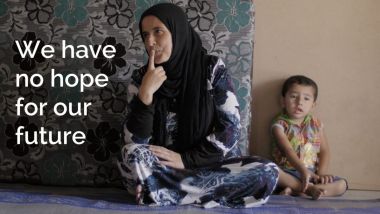
Almost all of the people I meet are women caring on their own for numerous children. But Samah's husband is with her in Lebanon. He works illegally harvesting grapes in the vineyard. It's temporary work because the harvest will soon be over, but temporary work is better than no work at all.
Samah has less than nothing to her name; she is heavily pregnant and heavily in debt. She has had to borrow money from local businessmen to pay for an operation for her young son and to give birth in the hospital she will need 750 dollars. Her friend Hiya is with us in the tent, cradling a three-month-old baby. Hiya tells me that while she was in labour she had to go to six different hospitals because no one would help her deliver her baby. It is hard to believe that a woman in labour would have been turned away by doctors, but these are difficult times in Lebanon.
Her son Ahmed has large brown eyes and gurgles away contentedly in the tent. I wonder what his future holds. He was born a refugee, his mother fought hard that so he would be born safely and she loves him fiercely, but like 4 million other Syrians living outside their country, she has no idea if she will be able to protect him in the future.
Samah knows that winter is coming. Although now in the Bekah valley it is 33 degrees centigrade and often too hot to sleep indoors at night, in just a few weeks they are expecting snow to come. Last year they watched many refugees die of exposure. I worry for her – she will have a new born baby to care for and no money to pay for food or electricity. When I ask her what her hopes are for the future, she tells me, "We have no hope".
Ahmed: "We have been waiting, but where have you been?"
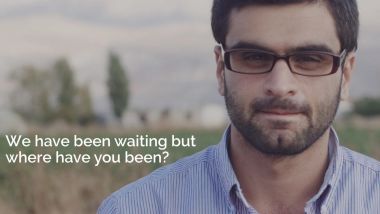
I speak with a young Syrian man in his twenties. Ahmed had nearly finished his Masters degree in marketing at the University of Damascus. He had to leave because life was becoming too dangerous for him to continue his studies. Ahmed seems outraged that only now the world is giving attention to the plight of the Syrian refugees.
He reminds me that this war has been going on for five years. "Why is it only now that you are interested? I want to ask the world 'Where have you been?'"
Ahmed's question stings because it has a ring of truth about it. Why have we been so slow to react? There was a lot of interest in Syria when the conflict began, but as the shelling, the bombing and the use of chemical weapons became so commonplace the conflict stopped being newsworthy. Sadly, it took the death of a three-year-old boy to reawaken public interest. The fear is that that now even his image is fading in our nation's memory.
Many of the refugees tell me that they too saw the picture of young Aylan Kurdi and they wept for him and for his family. They call the journey to Europe that Aylan's family took the "route of death". The refugees explain that when you have run out of hope even death seems better than this existence. The fact that ordinary educated people have made desperate choices to cross the Mediterranean sea in overcrowded boats is a measure of how bad things have become.
I am impressed by Ahmed. He doesn't know if he will ever be able to resume his studies and so he spends his days helping in the informal settlements. As Ahmed shows me around one of the camps, all the children flock to him and the families invite him to share tea with them. As the children stop to play a game with us, they try to teach me the Arabic words for my nose, ears, mouth and chin. My pronunciation is so poor giggles break out and we laugh together.
We share the same features, we are united by our common humanity. These children deserve the same opportunities to live in safety as our own. Ahmed's question haunts me: "Where have you been?"
And now that we have met him and the others, there is another: how far will we go to help?
Dr Krish Kandiah is founder and director of Home for Good.
* Names have been changed to protect identities.











